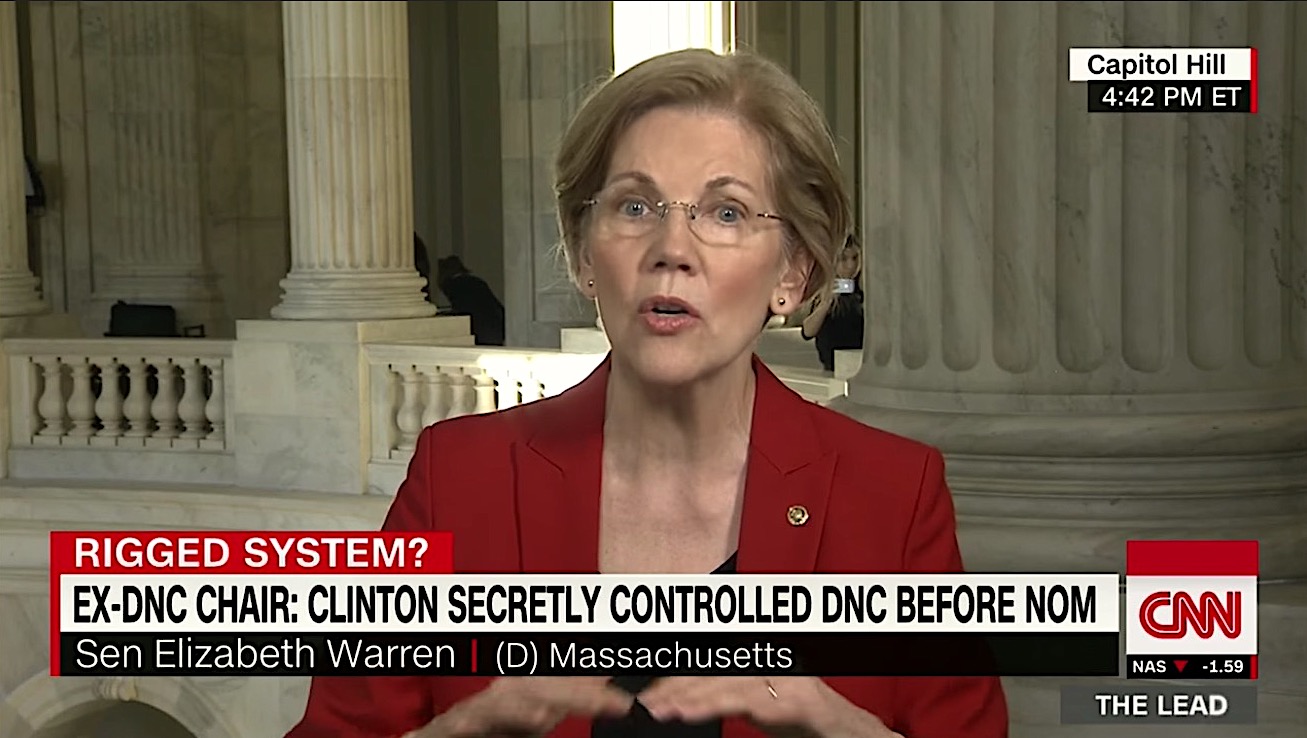Sen. Elizabeth Warren agrees that the Clinton-Sanders primary was 'rigged,' calls it a 'real problem'


A free daily email with the biggest news stories of the day – and the best features from TheWeek.com
You are now subscribed
Your newsletter sign-up was successful
On Thursday, President Trump and Sen. Elizabeth Warren (D-Mass.), a potential 2020 challenger, actually agreed on something: that Hillary Clinton's campaign "rigged" the 2016 Democratic primary. The charge had been leveled by former Democratic National Convention chairwoman Donna Brazile in a book excerpt she shared with Politico. Clinton faced a few rivals for the Democratic nomination, but her only serious challenger was Sen. Bernie Sanders (Vt.), an independent who caucuses with the Democrats.
On Thursday evening, CNN's Jake Tapper asked Warren if she was shocked at Brazile's assertions — that Clinton entered a joint fundraising agreement with the DNC in August 2015, and in exchange for raising money for the heavily indebted party, was given significant control over the DNC's operations. "This is a real problem" and a test for new DNC chairman Tom Perez, Warren said. "And either he's going to succeed by bringing Bernie Sanders and Bernie Sanders' representatives into this process, and they're going to say it's fair, this works, we all believe it, or he's going to fail, and I very much hope he succeeds." Tapper asked Warren if she agreed with the idea that the primaries were rigged, she looked surprised at the question. "Yes," she said.
Charlie Baker, former Hillary for America's chief administrative officer, responded to Brazile's accusations in a statement Thursday, saying that the Clinton campaign "was keeping the party afloat, which included state party funding to administer caucuses, which Secretary Clinton lost the majority of" to Sanders. The Clinton campaign was "proud" to raise money for the DNC and leave it "in a better financial position following the election than it had been in decades," Baker said. He also said that joint fundraising agreements "are common," used by Al Gore, John Kerry, Trump, and even Sanders — about two months after Clinton — though Sanders "raised little to no money" through the agreement. He ended by urging Democrats to unite, which seems like longer-term goal.
The Week
Escape your echo chamber. Get the facts behind the news, plus analysis from multiple perspectives.

Sign up for The Week's Free Newsletters
From our morning news briefing to a weekly Good News Newsletter, get the best of The Week delivered directly to your inbox.
From our morning news briefing to a weekly Good News Newsletter, get the best of The Week delivered directly to your inbox.
A free daily email with the biggest news stories of the day – and the best features from TheWeek.com
Peter has worked as a news and culture writer and editor at The Week since the site's launch in 2008. He covers politics, world affairs, religion and cultural currents. His journalism career began as a copy editor at a financial newswire and has included editorial positions at The New York Times Magazine, Facts on File, and Oregon State University.
-
 Antonia Romeo and Whitehall’s women problem
Antonia Romeo and Whitehall’s women problemThe Explainer Before her appointment as cabinet secretary, commentators said hostile briefings and vetting concerns were evidence of ‘sexist, misogynistic culture’ in No. 10
-
 Local elections 2026: where are they and who is expected to win?
Local elections 2026: where are they and who is expected to win?The Explainer Labour is braced for heavy losses and U-turn on postponing some council elections hasn’t helped the party’s prospects
-
 6 of the world’s most accessible destinations
6 of the world’s most accessible destinationsThe Week Recommends Experience all of Berlin, Singapore and Sydney
-
 Witkoff and Kushner tackle Ukraine, Iran in Geneva
Witkoff and Kushner tackle Ukraine, Iran in GenevaSpeed Read Steve Witkoff and Jared Kushner held negotiations aimed at securing a nuclear deal with Iran and an end to Russia’s war in Ukraine
-
 Pentagon spokesperson forced out as DHS’s resigns
Pentagon spokesperson forced out as DHS’s resignsSpeed Read Senior military adviser Col. David Butler was fired by Pete Hegseth and Homeland Security spokesperson Tricia McLaughlin is resigning
-
 Judge orders Washington slavery exhibit restored
Judge orders Washington slavery exhibit restoredSpeed Read The Trump administration took down displays about slavery at the President’s House Site in Philadelphia
-
 Hyatt chair joins growing list of Epstein files losers
Hyatt chair joins growing list of Epstein files losersSpeed Read Thomas Pritzker stepped down as executive chair of the Hyatt Hotels Corporation over his ties with Jeffrey Epstein and Ghislaine Maxwell
-
 Judge blocks Hegseth from punishing Kelly over video
Judge blocks Hegseth from punishing Kelly over videoSpeed Read Defense Secretary Pete Hegseth pushed for the senator to be demoted over a video in which he reminds military officials they should refuse illegal orders
-
 Trump’s EPA kills legal basis for federal climate policy
Trump’s EPA kills legal basis for federal climate policySpeed Read The government’s authority to regulate several planet-warming pollutants has been repealed
-
 House votes to end Trump’s Canada tariffs
House votes to end Trump’s Canada tariffsSpeed Read Six Republicans joined with Democrats to repeal the president’s tariffs
-
 Bondi, Democrats clash over Epstein in hearing
Bondi, Democrats clash over Epstein in hearingSpeed Read Attorney General Pam Bondi ignored survivors of convicted sex offender Jeffrey Epstein and demanded that Democrats apologize to Trump
